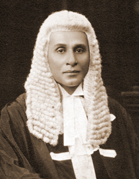Related Research Articles
Sirima Ratwatte Dias Bandaranaike, commonly known as Sirimavo Bandaranaike (මැතිනිය), was a Sri Lankan politician. She was the world's first female prime minister when she became Prime Minister of Sri Lanka in 1960. She chaired the Sri Lanka Freedom Party (SLFP) from 1960 to 1994 and served three terms as prime minister, two times as the chief executive, 1960 to 1965 and 1970 to 1977, and once again in a presidential system from 1994 to 2000, governing under the presidency of her daughter Chandrika Kumaratunga.

Sir Alexander Francis Molamure, was a Ceylonese politician. He became the first speaker of both the State Council of Ceylon and Parliament of Ceylon. He was a controversial figure due to his departure from the State Council due to a court conviction and for organising the Panamure Elephant Kraal in 1950.

The Prime Minister of the Democratic Socialist Republic of Sri Lanka is the head and most senior member of parliament in the cabinet of ministers. It is the second-most powerful position in Sri Lanka's executive branch behind the president, who is the constitutional chief executive. The Cabinet is collectively held accountable to parliament for their policies and actions.

The 1st State Council of Ceylon was a meeting of the State Council of Ceylon, with the membership determined by the results of the 1931 state council election held between 13 and 20 June 1931. The parliament met for the first time on 7 July 1931 and was dissolved on 7 December 1935.

The 2nd State Council of Ceylon was a meeting of the State Council of Ceylon, with the membership determined by the results of the 1936 state council election held between 22 February and 7 March 1936. The parliament met for the first time on 17 March 1936 and was dissolved on 4 July 1947.
Roland Stephen Tennekoon was an elected member of both the 1st and 2nd State Councils of Ceylon.
Edwin Wilfred Abeygunasekera was a member of the 1st and 2nd State Councils of Ceylon.
Clement Johnston Black was a Chartered Accountant and a member of the 1st and 2nd State Councils of Ceylon.
Hubert Ernest Newnham CMG BA (Oxon) (1886–1970) was a Ceylonese civil servant and politician.
John Gladstone Rajakulendran was a Ceylon Tamil politician and teacher.
Bernard Jayasuriya was a Ceylonese businessman and politician.
Upali Batuwantudawe was a Ceylonese lawyer and politician.
Richard Charles Kannangara was a Ceylonese tea plantation owner and politician.

Dewan Bahadur Chevalier Ignatius Xavier Pereira was a colonial-era Ceylonese businessman and politician.
Evelyn Charles Arthur Villiers JP UPM was a British planter and politician in colonial Ceylon.
John Herbert Ilangatileke was a Colonial-era Ceylonese politician.
Daniel Dias Gunasekera was a Ceylonese businessman and politician.
Galappatti Kankanange William Perera was a Ceylonese lawyer, educator, politician and diplomat.
Vela Thanthiri Gurunnanselage Karunaratne was a Ceylonese actor and politician.
References
- ↑ "Hon. Goonesekera, Henry Abeywickrema, M.P." Parliament of Sri Lanka . Retrieved 28 March 2019.
- 1 2 Members of the Legislatures of Ceylon: 1931-1972. National State Assembly Library. 1972. p. 54.
- 1 2 Jiggins, Janice (1979). Caste and Family Politics of the Sinhalese 1947-1976. Cambridge University Press. p. 100. ISBN 9780521220699.
- ↑ Ferguson's Ceylon Directory. Colombo: The Ceylon Observer Press. 1917. p. 53.
- ↑ The Dominions Office and Colonial Office List Comprising Historical and Statistical Information Respecting the Overseas Dominions and Colonial Dependencies of Great Britain. Colonial Office. 1940. p. 284.
- ↑ Ferguson's Ceylon Directory. Colombo: The Ceylon Observer Press. 1942. p. 211.
- ↑ "Parliamentary Debates". 41 (15–28). Parliament of Sri Lanka. 1961: 3778.
{{cite journal}}: Cite journal requires|journal=(help) - ↑ Goonetilleke, T. V. (1984). Facets of Our Legislature. Library of Parliament. p. 39-40.